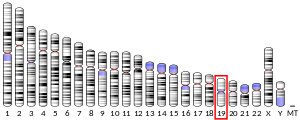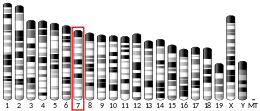Free fatty acid receptor 2
Free fatty acid receptor 2 (FFAR2) is a G-protein coupled receptor encoded by the FFAR2 gene.[5]
Expression
FFAR2 mRNA is expressed in adipose tissue, pancreas, spleen, lymph nodes, bone marrow, and peripheral blood mononuclear cells.[6][7] FFAR2 transcription is regulated by the XBP1 transcription factor which binds to the core promoter.[8]
Function
Mouse studies utilizing Ffar2 gene deletions have implicated the receptor in the regulation of energy metabolism and immune responses.[9] However, discrepancies between the pathways activated by FFAR2 agonists in human cells and the equivalent murine counterparts have been observed.[10][11][12]
Heteromerization
FFAR2 may interact with FFAR3 to form a FFAR2-FFAR3 receptor heteromer with signalling that is distinct from the parent homomers.[13]
See also
References
- 1 2 3 GRCh38: Ensembl release 89: ENSG00000126262 - Ensembl, May 2017
- 1 2 3 GRCm38: Ensembl release 89: ENSMUSG00000051314 - Ensembl, May 2017
- ↑ "Human PubMed Reference:".
- ↑ "Mouse PubMed Reference:".
- ↑ "Entrez Gene: FFAR2 free fatty acid receptor 2".
- ↑ Nilsson NE, Kotarsky K, Owman C, Olde B (2003). "Identification of a free fatty acid receptor, FFA2R, expressed on leukocytes and activated by short-chain fatty acids". Biochem. Biophys. Res. Commun. 303 (4): 1047–52. doi:10.1016/S0006-291X(03)00488-1. PMID 12684041.
- ↑ Le Poul E, Loison C, Struyf S (2003). "Functional characterization of human receptors for short chain fatty acids and their role in polymorphonuclear cell activation". J. Biol. Chem. 278 (28): 25481–9. doi:10.1074/jbc.M301403200. PMID 12711604.
- ↑ Ang Z, Er JZ, Ding JL (2015). "The short-chain fatty acid receptor GPR43 is transcriptionally regulated by XBP1 in human monocytes". Sci. Rep. 5: 8134. doi:10.1038/srep08134. PMC 4311239. PMID 25633224.
- ↑ Bindels, Laure B.; Dewulf, Evelyne M.; Delzenne, Nathalie M. (2013-04-01). "GPR43/FFA2: physiopathological relevance and therapeutic prospects". Trends in Pharmacological Sciences. 34 (4): 226–232. doi:10.1016/j.tips.2013.02.002. ISSN 1873-3735. PMID 23489932.
- ↑ Dewulf, Evelyne M.; Ge, Qian; Bindels, Laure B.; Sohet, Florence M.; Cani, Patrice D.; Brichard, Sonia M.; Delzenne, Nathalie M. (2013-01-17). "Evaluation of the relationship between GPR43 and adiposity in human". Nutrition & Metabolism. 10 (1): 11. doi:10.1186/1743-7075-10-11. PMC 3577645. PMID 23327542.
- ↑ Priyadarshini, Medha; Villa, Stephanie R.; Fuller, Miles; Wicksteed, Barton; Mackay, Charles R.; Alquier, Thierry; Poitout, Vincent; Mancebo, Helena; Mirmira, Raghavendra G. (2015-07-01). "An Acetate-Specific GPCR, FFAR2, Regulates Insulin Secretion". Molecular Endocrinology (Baltimore, Md.). 29 (7): 1055–1066. doi:10.1210/me.2015-1007. ISSN 1944-9917. PMC 4484778. PMID 26075576.
- ↑ Ang, Zhiwei; Er, Jun Zhi; Tan, Nguan Soon; Lu, Jinhua; Liou, Yih-Cherng; Grosse, Johannes; Ding, Jeak Ling (2016-09-26). "Human and mouse monocytes display distinct signalling and cytokine profiles upon stimulation with FFAR2/FFAR3 short-chain fatty acid receptor agonists". Scientific Reports. 6: 34145. doi:10.1038/srep34145. ISSN 2045-2322. PMC 5036191. PMID 27667443.
- ↑ Ang, Zhiwei; Xiong, Ding; Wu, Min; Ding, Jeak Ling (2017-09-07). "FFAR2-FFAR3 receptor heteromerization modulates short-chain fatty acid sensing". The FASEB Journal. 32: –201700252RR. doi:10.1096/fj.201700252RR. ISSN 0892-6638. PMC 5731126. PMID 28883043. Retrieved 2017-09-10.
External links
- "Free Fatty Acid Receptors: FFA2". IUPHAR Database of Receptors and Ion Channels. International Union of Basic and Clinical Pharmacology.
Further reading
- Brown AJ, Jupe S, Briscoe CP (2005). "A family of fatty acid binding receptors". DNA Cell Biol. 24 (1): 54–61. doi:10.1089/dna.2005.24.54. PMID 15684720.
- Sawzdargo M, George SR, Nguyen T, et al. (1997). "A cluster of four novel human G protein-coupled receptor genes occurring in close proximity to CD22 gene on chromosome 19q13.1". Biochem. Biophys. Res. Commun. 239 (2): 543–7. doi:10.1006/bbrc.1997.7513. PMID 9344866.
- Senga T, Iwamoto S, Yoshida T, et al. (2003). "LSSIG is a novel murine leukocyte-specific GPCR that is induced by the activation of STAT3". Blood. 101 (3): 1185–7. doi:10.1182/blood-2002-06-1881. PMID 12393494.
- Strausberg RL, Feingold EA, Grouse LH, et al. (2003). "Generation and initial analysis of more than 15,000 full-length human and mouse cDNA sequences". Proc. Natl. Acad. Sci. U.S.A. 99 (26): 16899–903. doi:10.1073/pnas.242603899. PMC 139241. PMID 12477932.
- Brown AJ, Goldsworthy SM, Barnes AA, et al. (2003). "The Orphan G protein-coupled receptors GPR41 and GPR43 are activated by propionate and other short chain carboxylic acids". J. Biol. Chem. 278 (13): 11312–9. doi:10.1074/jbc.M211609200. PMID 12496283.
- Nilsson NE, Kotarsky K, Owman C, Olde B (2003). "Identification of a free fatty acid receptor, FFA2R, expressed on leukocytes and activated by short-chain fatty acids". Biochem. Biophys. Res. Commun. 303 (4): 1047–52. doi:10.1016/S0006-291X(03)00488-1. PMID 12684041.
- Le Poul E, Loison C, Struyf S, et al. (2003). "Functional characterization of human receptors for short chain fatty acids and their role in polymorphonuclear cell activation". J. Biol. Chem. 278 (28): 25481–9. doi:10.1074/jbc.M301403200. PMID 12711604.
- Grimwood J, Gordon LA, Olsen A, et al. (2004). "The DNA sequence and biology of human chromosome 19". Nature. 428 (6982): 529–35. doi:10.1038/nature02399. PMID 15057824.
- Gerhard DS, Wagner L, Feingold EA, et al. (2004). "The status, quality, and expansion of the NIH full-length cDNA project: the Mammalian Gene Collection (MGC)". Genome Res. 14 (10B): 2121–7. doi:10.1101/gr.2596504. PMC 528928. PMID 15489334.
- Yonezawa T, Kobayashi Y, Obara Y (2007). "Short-chain fatty acids induce acute phosphorylation of the p38 mitogen-activated protein kinase/heat shock protein 27 pathway via GPR43 in the MCF-7 human breast cancer cell line". Cell. Signal. 19 (1): 185–93. doi:10.1016/j.cellsig.2006.06.004. PMID 16887331.




